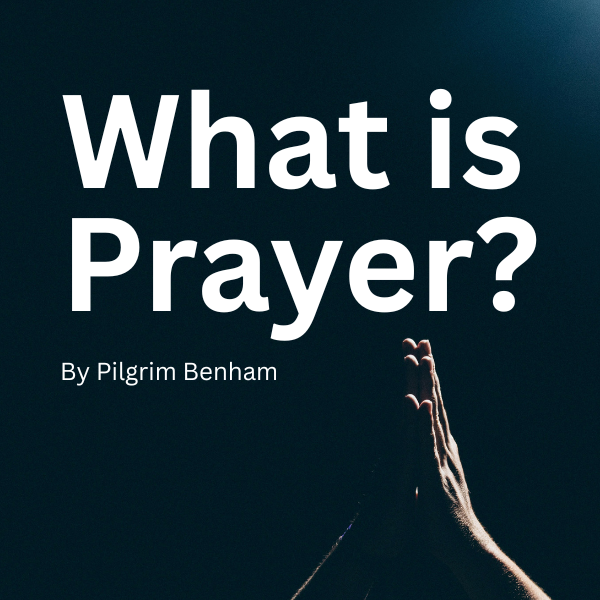
Have you ever heard the idea that “God is sovereign and doesn’t need you”? In one sense, yes, it’s true that God is holy, set apart, and in a different class altogether than his creation. There are only two categories: God and all of creation. So in that sense, God doesn’t need oxygen, energy, food, water, or friendship; the Triune God is perfect in his loving, relational community. He has no beginning or end, and he won’t ever need a nap or help.
We may get tempted to adopt an unbiblical, fatalistic attitude: “Well, why bother praying? God is going to do what God does either way.” While God is sovereign and doesn’t need our prayers to accomplish his will, he graciously chooses to work through our prayers, making us partners in his divine plan.
Prayer is God’s gracious invitation to intimacy, identity, and involvement with both his Person and his purposes.
God invites us, graciously, toward him. In prayer, we draw near to the One who’s already drawn near to us. This is relational, not transactional. Prayer reinforces our true identity as adopted, redeemed, beloved children of our heavenly Father. Through Christ, we can approach our Father and lay hold of our sonship, affirmed by the Holy Spirit’s witness in us and to us. Prayer isn’t passivity; it’s participation in God’s unfolding will on earth. It isn’t a pause in the mission; it’s part of the mission! When we pray, we’re not doing so to merely get things from God, but we’re getting more of God himself.
Consider four attributes of prayer:
1. Prayer is precious.
Revelation 8:3–4 reveals that God considers our prayers so precious that he stores them in golden bowls of incense. Have you thought about how God views your prayers? Your stumbled, half-distracted prayers that wander off mid-sentence. Your whispered pleas in the dark when the world is fast asleep. Your steady prayers for others, even when they seem to vanish into thin air. Your groggy morning mutterings before the coffee kicks in. Your Bible-soaked requests that cling to God’s promises. Your Spirit-fueled groans when you don’t know what to say.
All of your prayers are gathered, heard, presented; not forgotten, not lost, not ignored. God considers them fragrant. They rise before God, carried by angels, mingled with incense, placed on the altar of heaven. In the fullness of time, heaven will answer. Our prayers move history. They shake kingdoms. They call down mercy. They trigger judgment.
They prepare the way of the Lord. Don’t you dare believe the lie that your prayers don’t matter. In the economy of God, not one prayer is wasted, because every prayer is precious.
2. Prayer is powerful.
Mary Queen of Scotland was quoted as saying, “I fear John Knox’s prayers more than an army of ten thousand men.”
Just because we don’t see miraculous answers to our prayers doesn’t mean God isn’t at work. In fact, maybe the truth is we’re praying such small prayers that heaven doesn’t have to be moved! I think that we, as followers of an almighty God, should pray big, audacious prayers.
What we find in Revelation 5 and 8 is that the prayers of the saints throughout time are a part of the sovereign work of God in the world. Think of the prayers of Moses and the Red Sea parting, of Joshua and the sun standing still, of Elijah and the fire on Mt. Carmel. Think of Elisha, Hannah, Hezekiah, Solomon, Daniel, Jonah and Jehoshaphat — not to mention Paul and Silas, Peter and the early church — all crying out to God and seeing history moved, God’s enemies destroyed, lives resurrected, and creation stirred.
Charles Spurgeon said, “Prayer is the slender nerve that moves the muscle of omnipotence.” In an ultimate sense though, it isn’t that our prayers are powerful; it’s that the God we’re praying to is all-powerful! That’s why #3 is important:
3. Prayer is persistent.
You might say, “Well, I haven’t seen my prayers answered …” I would simply say, “Don’t mistake delay for denial.” Sometimes God works instantly, and other times we have to trust that his ways are higher (and better) than our ways.
This is where persistence is key. In Luke 18, Jesus taught us the parable of the persistent widow. If you don’t know this story, there’s a widow who persistently seeks justice from an unjust judge who eventually grants her request, not because he’s righteous, but because he’s tired of her bothering him! Jesus uses this contrast to emphasize that if even an unrighteous judge will respond to persistence, how much more will God, who’s just and loving, respond to the cries of his people?
I can think of multiple times in the past several years when I have asked the Lord to direct my family’s steps, and for a time we weren’t sure what on earth God was up to. However, my persistent prayer was: “Lord, make it clear. Lord, lead and direct us. Lord, we trust you, guide us!” Now, after years of praying and trusting and waiting and seeking, we finally understand and are beginning to see how his will is shaping up for our good and his glory.
Persistence doesn’t mean we perform vain repetition and merely repeat a prayer mindlessly over and over, because our fourth attribute is that:
4. Prayer is personal.
Did you know that in Islam, Mohammad provided 99 names for God, but none of them are “father”? In contrast, Jesus calls God “Father” over 160 times in the Scriptures! He taught us to pray not to “our Master,” but “our Father, who is in heaven.” We’re invited in the New Testament to call God “Abba,” which is Aramaic for father and conveys intimacy and sonship. God as our Father communicates love, faithfulness, discipline, protection, and the provision of an inheritance.
When we say prayer is personal, that means the highest goal of prayer isn’t having our personal requests answered, but having a closer, personal connection to the God over all creation! The One who created the sun, moon, and stars welcomes us not as servants, not as slaves, but as sons. Prayer is only possible because of the One who died and rose again.
Therefore, our heart posture should be reverence, as we allow the holy hush to invade our unholy rush. I don’t know a single Christian who says their prayer life is where they want it to be! Isn’t our number one excuse that we don’t have time?
Paul Washer said, “When we don’t pray, we teach ourselves that we are sufficient without God.” Is that true of you? Of course you don’t believe that! However, you and I often live as though it were true. “I would pray more, but I just don’t have time.”
Consider this: the only prayers that don’t get stored in the bowl of incense are the ones you refuse to make time for. Imagine a busy mom carving out 10 minutes each morning to pray before her kids wake up. That small act of reverence reshapes her day, and can reshape her children’s lives.
Hebrews 10:19-21 says, “Therefore, brothers, since we have confidence to enter the holy places by the blood of Jesus, by the new and living way that he opened for us through the curtain, that is, through his flesh, and since we have a great priest over the house of God, let us draw near with a true heart in full assurance of faith …”
Beloved, you and I aren’t drawing near because of our worthiness, but because of Christ’s. Remember Revelation chapter 4? Only the slain Lamb is worthy! Through him, we can have confidence as we draw near to the Father with a true heart in full assurance of faith. So pray when you don’t feel like it because prayer isn’t about performance, but persistence. Schedule time this week to meet with God, and when you do, confidently rest in your relationship, expecting and anticipating God to work.
What would happen if we as believers cultivated a life of prayer beyond just emergencies? What if prayer was not crisis-mode, but consistent communion? If we collectively prayed as the people of God, we would be joining the God of heaven in his redemptive work on the earth. We would see lives transformed, and our city won.
J.S. Baxter said, “Men may spurn our appeals, reject our message, oppose our arguments, despise our persons, but they are helpless against our prayers.”
You might think “but I’m just one little believer, in one local church. How can my prayers change the world?” Have you ever heard about a small community of believers called the Moravians who lived in the seventeen hundreds in Germany? These believers, led by Count Zinzendorf, began what would become known as the Moravian 24/7 prayer chain: a continuous prayer meeting that would last over 100 years.
Out of this furnace of prayer came one of the boldest missionary movements in church history. The Moravian missions movement was born out of a single local church committed to sustained, persistent, believing prayer. They launched a global gospel fire through their tears and intercession.
Consider praying this prayer, “Father, your word says the prayers of a righteous man are powerful and effective. I thank you that when I don’t feel righteous, our Lord Jesus Christ, the one Mediator between man and God, is interceding on my behalf. I thank you that in Christ, I can approach your throne with confidence and full assurance of faith. As the disciples asked, teach us to pray. Strengthen me to set time aside to spend with you. Would you grant me your grace in my time of need? I thank you that you haven’t left me as an orphan, but have sent your Spirit to be with me, in me, and upon me. Holy Spirit, when I don’t know how or what to pray, fill my mind, my heart, and my lips with the right words. I want to see your kingdom come and your will be done, on earth as it is in heaven. Use me to reach my community, this region, and even see disciples made to the ends of the earth, for your glory and my neighbor’s good. I delight in you and you alone, and pray all of this because of, and in the good name of, my great God and Savior, Jesus Christ. Amen.”







